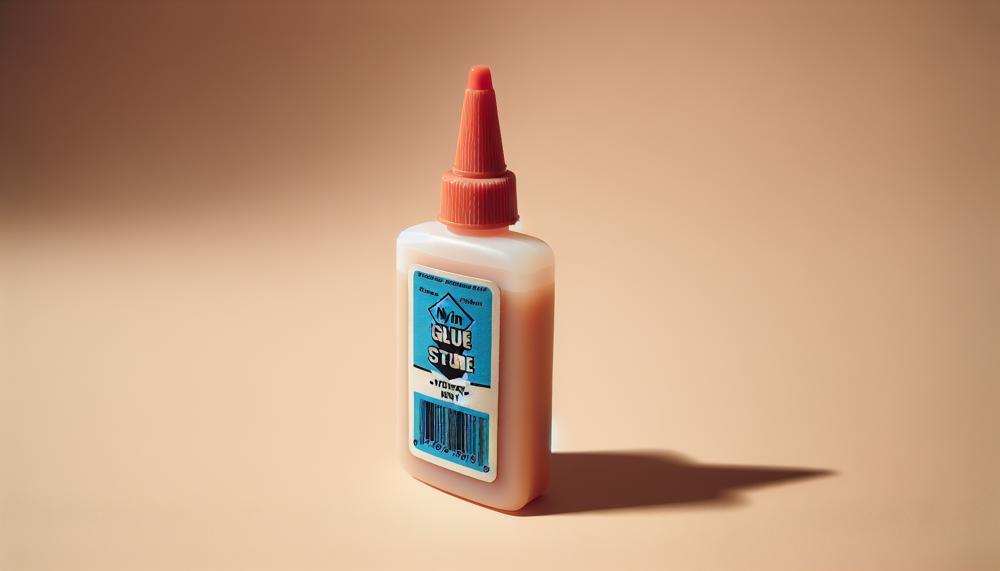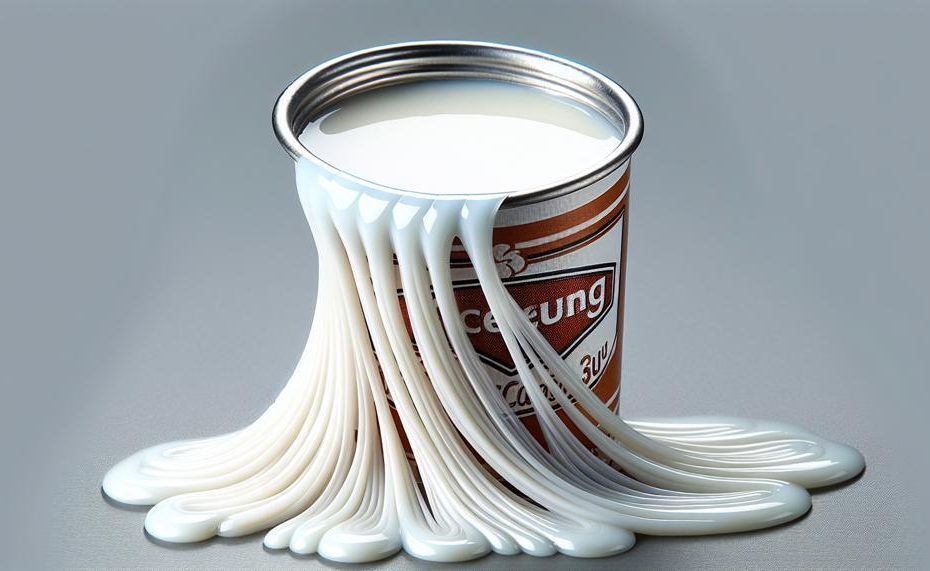Are you tired of endlessly searching for the perfect adhesive to use on your nylon projects?
If so, look no further. Nylon is a resilient and versatile material, but finding the right glue to effectively bond it can be a daunting task.
We’ve done all the research and testing for you. In this blog post, we’ll delve into the world of glues for nylon and reveal our top picks that are sure to make your projects stick.
We’ll cover all the essential factors to consider when choosing a glue for nylon, such as strength, flexibility, and compatibility. Plus, we’ll provide in-depth reviews of each product’s pros and cons so that you can make an informed decision.
So let’s jump right in and discover the best options for bonding nylon.
Table of Contents
What glue works best on nylon?
When it comes to choosing the right glue for nylon materials, there are a few options to consider. Cyanoacrylate (CA) glue, also known as super glue, is a popular choice due to its fast-drying properties and strong adhesive strength.
It is also available in different viscosities, making it suitable for various applications on nylon. However, it’s important to note that CA glue may become brittle over time and requires proper surface preparation for optimal bonding.
Polyurethane (PU) glue is another option for nylon materials. It creates a strong and flexible bond that can withstand vibrations and movements, making it ideal for repairing outdoor gear or bonding plastic components. However, this type of glue requires pressure while curing and is best used on porous surfaces or roughened nylon, which can be messy.
Epoxy glue is a two-part adhesive that forms a strong and durable bond on various materials, including nylon. It is also heat-resistant and available in different formulations. However, it requires careful mixing ratio and surface preparation for optimal bonding.
When choosing the best glue for nylon materials, it’s crucial to consider the specific application and properties of each type of glue. All three options mentioned above have their own strengths and weaknesses that should be taken into account. Ultimately, the best glue for nylon will depend on the specific needs and requirements of your project.
| Cyanoacrylate (CA) Glue | Polyurethane (PU) Glue | Epoxy Glue |
| – This type of glue dries quickly and has strong adhesive properties. – It is available in different viscosities, making it suitable for various applications on nylon. – However, this glue may become brittle over time and needs proper surface preparation for optimal results. |
– Polyurethane glue creates a strong and flexible bond that can withstand vibrations and movements. – It is an ideal choice for repairing outdoor gear or bonding plastic components. – However, it requires pressure while curing and is best used on porous surfaces or roughened nylon, which can be messy. |
– Epoxy glue is a two-part adhesive that forms a strong and durable bond on various materials, including nylon. – It is also heat-resistant and available in different formulations. – However, it requires careful mixing ratio and surface preparation for optimal bonding. |
When choosing the best glue for nylon materials, consider the specific application and properties of each type of glue.
All three types mentioned above have their own strengths and weaknesses that should be considered.
What is Nylon?
Nylon, a versatile synthetic polymer material, has become a staple in various industries and crafts due to its strength, durability, and flexibility.
Originally developed as a substitute for silk in the 1930s, nylon has quickly gained popularity as a material for clothing, carpets, ropes, and other products.
However, when it comes to choosing the best adhesive for nylon, one must consider its unique properties, such as its smooth surface, water-resistance, and flexibility.
These factors can significantly impact the effectiveness of different types of glue and must be taken into account to ensure a strong and long-lasting bond.
Properties of Nylon:
- Strong and durable
- Smooth surface
- Water-resistant
- Flexible
The Importance of Choosing the Best Glue for Nylon:
Selecting the right adhesive for nylon is crucial because of its distinctive features and characteristics.
The smooth surface of nylon may require a specific type of glue to achieve a strong bond while its water-resistance can affect the drying time of the adhesive.
Additionally, the flexibility of nylon may necessitate a more flexible glue to prevent any cracking or breaking of the bond.
Factors to Consider when Choosing Glue for Nylon:
- Type of surface being bonded to
- Water-resistance
- Permanence of bond
- Drying time
- Ease of use
Recommended Glues for Nylon:
- J-B Weld Plastic Bonder (for bonding nylon to nylon)
- Loctite Super Glue Ultra Gel Control (for bonding nylon and metal)
- E6000 Craft Adhesive (ideal for repairing nylon fabric)
- Gorilla Original Polyurethane Glue (suitable for outdoor projects involving metal and wood)
- Elmer’s Carpenters Wood Glue (for bonding nylon to wood)
- Gorilla Glue Gun (versatile use)
Types of Glue for Bonding Nylon
- Nylon is a versatile material that requires specific types of glue for bonding. There are various options to choose from, each with unique properties and benefits. These include epoxy adhesives, two-part polyurethane adhesives, hot glue, Gorilla glue, and glue guns. In addition to these, there are also specific options for bonding nylon to certain surfaces.
- Epoxy adhesives are a popular choice due to their high strength and durability. However, when bonding nylon, it is essential to select a softer and more flexible option as nylon is a relatively soft material. Two-part polyurethane adhesives are ideal for both indoor and outdoor projects, as they are flexible and have high peel strength.
- For bonding nylon to other heat-reactive materials like plastic, hot glue is an excellent option. The heat from the glue gun helps melt the nylon on the bonded side, creating a strong and lasting bond. Similarly, Gorilla glue is impact-resistant, waterproof, and suitable for both indoor and outdoor use when bonding thermoplastics like nylon.
- A glue gun can also be effectively used with nylon materials. The Professional Grade Super Glue from Gluemasters is a versatile and strong option for various projects involving nylon. However, it is crucial to choose a suitable option for the specific surface you are adhering the nylon too.
- J-B Weld Plastic Bonder is an ideal choice for nylon to nylon projects, while Loctite Super Glue Ultra Gel Control works well for bonding nylon to metal surfaces. For repairing nylon fabric, E6000 Craft Adhesive is a reliable option, while Elmer’s Carpenters Wood Glue is suitable for bonding nylon to wood.
Cyanoacrylate Adhesive (Super Glue)
Cyanoacrylate adhesive, commonly known as super glue, is a highly effective and fast-drying adhesive made from a compound of cyanoacrylate. Its widespread use in different industries and domestic settings is due to its ability to create strong bonds with a variety of materials, including nylon.
One of the reasons why cyanoacrylate adhesive is considered the best option for bonding nylon materials is its unique chemical composition. It has quick-drying properties, making it ideal for various applications.
Additionally, it is resistant to heat, water, and chemicals, making it a durable choice for bonding nylon to other surfaces. Its ability to form strong bonds through the process of polymerization also contributes to its effectiveness.
When selecting a cyanoacrylate adhesive for bonding nylon materials, it is crucial to choose a specific formulation designed for this purpose. This ensures a strong bond without causing any damage to the nylon material.
Epoxy Adhesives
When it comes to bonding nylon materials, epoxy adhesives are the go-to choice due to their unparalleled strength, chemical resistance, and durability. Let’s delve into why epoxy adhesives outshine other commonly used adhesives such as cyanoacrylate glue (super glue), epoxy glue, and polyurethane adhesives.
Compatibility:
| Epoxy Adhesives | Cyanoacrylate Glue | Epoxy Glue | Polyurethane Adhesives |
| Compatible with Nylon materials | Compatible with Nylon materials | May not be suitable for Nylon materials | May not be suitable for Nylon materials |
Bond Strength:
| Epoxy Adhesives | Cyanoacrylate Glue | Epoxy Glue | Polyurethane Adhesives |
| Unrivaled bond strength that can withstand extreme temperatures, chemicals, and moisture without compromising its grip. | Strong bond but may not have the same durability as epoxy adhesive. | Strong bond but may not have the same durability as epoxy adhesive. | Strong bond but may not have the same durability as epoxy adhesive. |
Environmental Conditions:
| Epoxy Adhesives | Cyanoacrylate Glue | Epoxy Glue | Polyurethane Adhesives |
| Can withstand extreme temperatures, chemicals, and moisture without compromising its bond strength. | May not be suitable for extreme temperatures, chemicals, and moisture. | May not be suitable for extreme temperatures, chemicals, and moisture. | May not be suitable for extreme temperatures, chemicals, and moisture. |
Polyurethane Adhesives
Polyurethane adhesives are known for their exceptional bonding capabilities and versatility in working with different materials, such as nylon.
However, they may come at a higher cost than other types of glue, and their processing time can be limited.
Glues to Avoid on Nylon
When it comes to bonding nylon material, there are certain types of glue that should be avoided to ensure a strong and durable bond. These include:
- Regular adhesives: These types of glues may not be able to effectively adhere to the porous and slippery surface of nylon, resulting in a weak bond that can easily break.
- Gorilla glue: Although known for its strong bonding abilities, Gorilla glue is not recommended for use on nylon material as it may not provide a reliable bond.
- Super glue: While super glue may work well for small and precise applications, it may not be suitable for use on certain fabrics like silk or wool. It may also struggle to bond properly with nylon.
- Polyurethane adhesives: While offering strong and flexible bonding for various materials, polyurethane adhesives can be expensive and have limited processing time, making them unsuitable for use on nylon.
To ensure a successful bond, it is best to choose adhesives specifically designed for nylon or those proven to work well on porous and slippery surfaces. Some suitable options include:
- Silicone caulk: This type of adhesive can effectively bond with nylon due to its ability to adhere to porous and slippery surfaces.
- Hot glue: Similar to silicone caulk, hot glue is also effective at bonding nylon material.
- E 600 craft adhesive: Known for its strong bonding abilities on various materials, including nylon, this adhesive is a reliable option.
- Loctite plastic bonder: Another proven option for bonding nylon is Loctite plastic bonder.
Preparing the Nylon Surface

Before applying any glue to a nylon surface, it is crucial to properly prepare the surface. This involves a few key steps, including cleaning, roughening, priming, and considering environmental factors.
By following these steps, you can ensure a strong and long-lasting bond between the nylon and the adhesive. Let’s take a closer look at each step in more detail.
Cleaning the Surface
Thoroughly cleaning the nylon surface is essential before applying any adhesive. Dirt, dust, or oils on the surface can prevent proper adhesion and compromise the strength of the bond.
To clean the surface, use a mild detergent and water solution and a soft cloth. Avoid using abrasive materials that could damage the nylon.
Roughening Up the Surface
Nylon surfaces are known for their durability, making them challenging to bond with adhesives. To create a better bonding surface, it is important to roughen up the nylon slightly. This can be achieved by gently sanding with fine-grit sandpaper or using a nylon abrasive pad.
The goal is not to remove any material but to create small scratches that will help the adhesive grip onto the surface.
Removing Dust and Debris
After roughening up the surface, it is crucial to remove any dust or debris that may have accumulated from sanding. Use a lint-free cloth or compressed air to ensure there is no residue left on the surface.
Any remaining debris can interfere with the adhesive’s ability to bond properly.
Priming the Surface
In addition to cleaning and roughening up the surface, priming is also essential before applying adhesive. Primers are specifically designed for difficult-to-bond materials like nylon and help improve adhesion.
They work by creating a chemical bond between the adhesive and the substrate for a stronger bond. It is important to follow the manufacturer’s instructions for the type of primer needed based on the type of adhesive being used.
Considering Temperature and Humidity
Temperature and humidity can also impact the strength and durability of the bond between the nylon surface and the adhesive.
It is crucial to follow the manufacturer’s instructions for specific recommendations on temperature and humidity levels.
Mechanical Fasteners vs Glue for Bonding Nylon
When it comes to bonding nylon materials, there are two commonly used options: mechanical fasteners and glue. Both have their own unique advantages and disadvantages, making it important to consider the specific needs and requirements of your project when choosing between the two.
Advantages of Using Mechanical Fasteners for Bonding Nylon Materials:
- Provides a strong, permanent bond: Mechanical fasteners offer a reliable and secure attachment that can withstand various conditions, making them a popular choice for bonding nylon materials.
- Global support from manufacturers: Companies like PennEngineering have facilities all over the world, providing easy access to their products and technical support for any questions or concerns.
- One-step installation process: Unlike glue, which requires drying time, mechanical fasteners can be installed in one step, making the bonding process more efficient and saving production time.
- Precise and efficient installation: With the use of automated feeding equipment, mechanical fasteners offer precise and efficient installation, reducing the chances of human error and increasing productivity.
Disadvantages of Using Mechanical Fasteners for Bonding Nylon Materials:
- May require specialized tools: Some types of mechanical fasteners may require specialized tools for installation, which may not be readily available or may add to the cost of production.
- Visible on the surface: Depending on the application, the visibility of mechanical fasteners on the surface of bonded materials may not be aesthetically pleasing.
- Risk of surface damage during installation: Improper installation of mechanical fasteners can cause damage to the surface of the bonded materials, affecting the overall quality of the bond.
Advantages of Using Glue for Bonding Nylon Materials:
- Adaptable to any shape or size: Glue can be easily applied to any shape or size of nylon material, making it a versatile option for bonding different types of objects.
- Fills gaps and irregularities: Glue can fill in small gaps and irregularities between surfaces, creating a stronger bond compared to mechanical fasteners.
- Less visible on the surface: Unlike mechanical fasteners, glue is not visible on the surface of the bonded materials, providing a more aesthetically pleasing finish.
Disadvantages of Using Glue for Bonding Nylon Materials:
- May weaken over time: Glue may weaken over time, especially when exposed to extreme temperatures, humidity, or chemicals, resulting in a weaker bond and potential failure.
- Requires proper preparation: A strong bond with glue requires proper preparation of the nylon surface, which can be time-consuming and labor-intensive.
- Not suitable for heavy loads: Glue may not be able to withstand heavy loads or high-stress applications, making it less suitable for certain bonding needs.
Also Read: How To Remove Sugru?
Conclusion
In conclusion, the search for the best glue for nylon can be a daunting task. With countless options available in the market, it’s easy to feel overwhelmed and frustrated. But don’t worry, we’ve done all the research and testing for you.
After diving into the realm of glues for nylon, we have uncovered our top picks that are guaranteed to make your projects stick. From cyanoacrylate (CA) glue to polyurethane (PU) glue and epoxy glue, we have covered all the essential factors to consider when choosing a glue for nylon.
It is crucial to consider the specific application and properties of each type of glue when selecting the best one for your project. Whether it’s strength, flexibility, or compatibility, our comprehensive reviews of each product’s pros and cons will help you make an informed decision.
To summarize, when it comes to bonding nylon materials, epoxy adhesives reign supreme. Their unmatched compatibility with nylon, exceptional bond strength that can withstand extreme conditions, and ability to resist environmental factors such as heat, chemicals, and moisture without compromising their grip make them the top choice.






